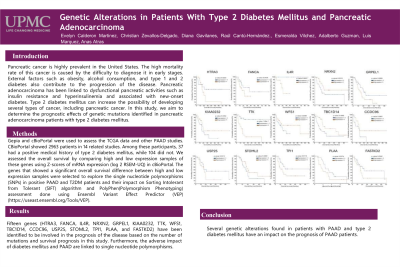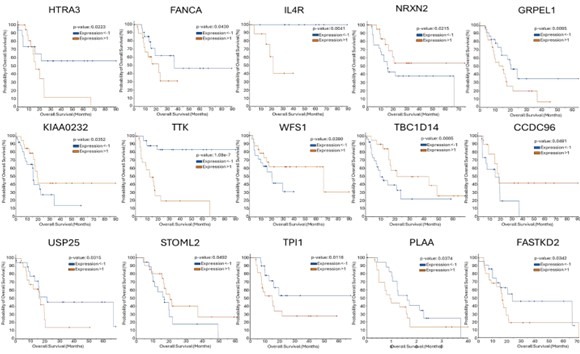Sunday Poster Session
Category: Biliary/Pancreas
P0001 - Genetic Alterations in Patients With Type 2 Diabetes Mellitus and Pancreatic Adenocarcinoma
Sunday, October 27, 2024
3:30 PM - 7:00 PM ET
Location: Exhibit Hall E

Has Audio

Evelyn Calderon Martinez, MD
UPMC Central PA
Harrisburg, PA
Presenting Author(s)
Evelyn Calderon Martinez, MD1, Christian Zevallos-Delgado, MS2, Diana Gavilanes, MD1, Raúl Cantú-Hernández, MD3, Esmeralda Vilchez, MD4, Adalberto Guzman, MD5, Luis Marquez, MS6, Anas Atras, MD1
1UPMC Central PA, Harrisburg, PA; 2University of Houston, Houston, TX; 3Instituto Tecnológico y de Estudios Superiores de Monterrey, Houston, TX; 4Baylor College of Medicine, Houston, TX; 5University of Arkansas for Medical Sciences, Harrisburg, PA; 6INIA, Arequipa, Arequipa, Peru
Introduction: Pancreatic cancer is highly prevalent in the United States. The high mortality rate of this cancer is caused by the difficulty to diagnose it in early stages. External factors such as obesity, alcohol consumption, and type 1 and 2 diabetes also contribute to the progression of the disease. Pancreatic adenocarcinoma has been linked to dysfunctional pancreatic activities such as insulin resistance and hyperinsulinemia and associated with new-onset diabetes. Type 2 diabetes mellitus can increase the possibility of developing several types of cancer, including pancreatic cancer. In this study, we aim to determine the prognostic effects of genetic mutations identified in pancreatic adenocarcinoma patients with type 2 diabetes mellitus.
Methods: Gepia and cBioPortal were used to assess the TCGA data and other PAAD studies. CBioPortal showed 2963 patients in 14 related studies. Among these participants, 37 had a positive medical history of type 2 diabetes mellitus, while 104 did not. We assessed the overall survival by comparing high and low expression samples of these genes using Z-scores of mRNA expression (log 2 RSEM-UQ) in cBioPortal. The genes that showed a significant overall survival difference between high and low expression samples were selected to explore the single nucleotide polymorphisms (SNPs) in positive PAAD and T2DM patients and their impact on Sorting Intolerant from Tolerant (SIFT) algorithm and PolyPhen(Polymorphism Phenotyping) assessment done using Ensembl Variant Effect Predictor (VEP) (https://useast.ensembl.org/Tools/VEP).
Results: Fifteen genes (HTRA3, FANCA, IL4R, NRXN2, GRPEL1, KIAA0232, TTK, WFS1, TBC1D14, CCDC96, USP25, STOML2, TPI1, PLAA, and FASTKD2) have been identified to be involved in the prognosis of the disease based on the number of mutations and survival prognosis in this study. Furthermore, the adverse impact of diabetes mellitus and PAAD are linked to single nucleotide polymorphisms.
Discussion: Several genetic alterations found in patients with PAAD and type 2 diabetes mellitus have an impact on the prognosis of PAAD patients.

Disclosures:
Evelyn Calderon Martinez, MD1, Christian Zevallos-Delgado, MS2, Diana Gavilanes, MD1, Raúl Cantú-Hernández, MD3, Esmeralda Vilchez, MD4, Adalberto Guzman, MD5, Luis Marquez, MS6, Anas Atras, MD1. P0001 - Genetic Alterations in Patients With Type 2 Diabetes Mellitus and Pancreatic Adenocarcinoma, ACG 2024 Annual Scientific Meeting Abstracts. Philadelphia, PA: American College of Gastroenterology.
1UPMC Central PA, Harrisburg, PA; 2University of Houston, Houston, TX; 3Instituto Tecnológico y de Estudios Superiores de Monterrey, Houston, TX; 4Baylor College of Medicine, Houston, TX; 5University of Arkansas for Medical Sciences, Harrisburg, PA; 6INIA, Arequipa, Arequipa, Peru
Introduction: Pancreatic cancer is highly prevalent in the United States. The high mortality rate of this cancer is caused by the difficulty to diagnose it in early stages. External factors such as obesity, alcohol consumption, and type 1 and 2 diabetes also contribute to the progression of the disease. Pancreatic adenocarcinoma has been linked to dysfunctional pancreatic activities such as insulin resistance and hyperinsulinemia and associated with new-onset diabetes. Type 2 diabetes mellitus can increase the possibility of developing several types of cancer, including pancreatic cancer. In this study, we aim to determine the prognostic effects of genetic mutations identified in pancreatic adenocarcinoma patients with type 2 diabetes mellitus.
Methods: Gepia and cBioPortal were used to assess the TCGA data and other PAAD studies. CBioPortal showed 2963 patients in 14 related studies. Among these participants, 37 had a positive medical history of type 2 diabetes mellitus, while 104 did not. We assessed the overall survival by comparing high and low expression samples of these genes using Z-scores of mRNA expression (log 2 RSEM-UQ) in cBioPortal. The genes that showed a significant overall survival difference between high and low expression samples were selected to explore the single nucleotide polymorphisms (SNPs) in positive PAAD and T2DM patients and their impact on Sorting Intolerant from Tolerant (SIFT) algorithm and PolyPhen(Polymorphism Phenotyping) assessment done using Ensembl Variant Effect Predictor (VEP) (https://useast.ensembl.org/Tools/VEP).
Results: Fifteen genes (HTRA3, FANCA, IL4R, NRXN2, GRPEL1, KIAA0232, TTK, WFS1, TBC1D14, CCDC96, USP25, STOML2, TPI1, PLAA, and FASTKD2) have been identified to be involved in the prognosis of the disease based on the number of mutations and survival prognosis in this study. Furthermore, the adverse impact of diabetes mellitus and PAAD are linked to single nucleotide polymorphisms.
Discussion: Several genetic alterations found in patients with PAAD and type 2 diabetes mellitus have an impact on the prognosis of PAAD patients.

Figure: Overall survival analysis of the selected genes with most significant prognosis (log-rank p-value <0.05). Comparison between Z-scores of mRNA expression (log 2 RSEM-UQ) cut-off >1 and <-1.
Disclosures:
Evelyn Calderon Martinez indicated no relevant financial relationships.
Christian Zevallos-Delgado indicated no relevant financial relationships.
Diana Gavilanes indicated no relevant financial relationships.
Raúl Cantú-Hernández indicated no relevant financial relationships.
Esmeralda Vilchez indicated no relevant financial relationships.
Adalberto Guzman indicated no relevant financial relationships.
Luis Marquez indicated no relevant financial relationships.
Anas Atras indicated no relevant financial relationships.
Evelyn Calderon Martinez, MD1, Christian Zevallos-Delgado, MS2, Diana Gavilanes, MD1, Raúl Cantú-Hernández, MD3, Esmeralda Vilchez, MD4, Adalberto Guzman, MD5, Luis Marquez, MS6, Anas Atras, MD1. P0001 - Genetic Alterations in Patients With Type 2 Diabetes Mellitus and Pancreatic Adenocarcinoma, ACG 2024 Annual Scientific Meeting Abstracts. Philadelphia, PA: American College of Gastroenterology.
